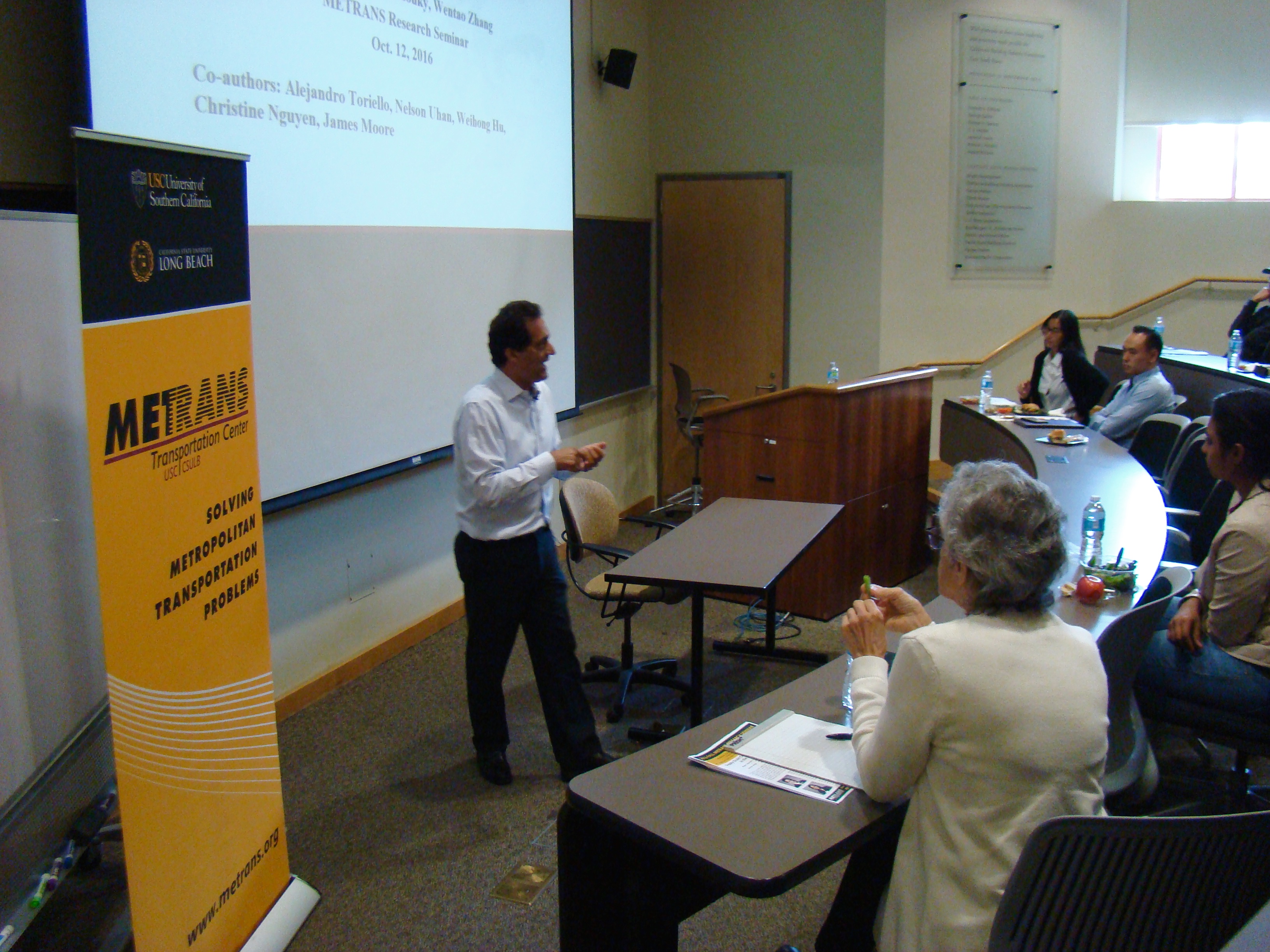News | METRANS Researchers Share Agricultural Supply Chain Consolidation and Cooperation Research
Stop the VideoNews

METRANS UTC
METRANS Researchers Share Agricultural Supply Chain Consolidation and Cooperation Research
Friday, October 21, 2016
by By Lauren Deaderick, MPP&MPL 2018

Photo by Blake Wagner
On Wednesday, October 12, 2016, Dr. Maged Dessouky, professor, Department of Industrial and Systems Engineering (ISE) at USC, and fourth year Ph.D. candidate from ISE USC Wentao Zhang, presented their work investigating supply chain consolidation and cooperation with the California Association of Flower Growers to students, faculty, and the public, as part of METRANS’ Fall Research Seminar Series. Their project started more than four years ago with the question: if California flower producers cooperated in warehousing and delivering their stock, could they gain back market share in Chicago from South American flower producers?
To answer this question, Dessouky compiled a multidisciplinary team of graduate students and professors to fully address the complexities. The team first looked at labor cost comparisons and found no large differences. Surprisingly, they found that transportation costs were much higher for California flower growers compared to their South American counterparts. The costs are lower for the South American growers because they fly their stock all together to Miami and then drive them in full truckloads to major markets like Chicago. By contrast, California growers are dispersed throughout the state and do not consolidate. Instead, the California growers individually send their stock via UPS or FEDEX. Without consolidation, most of the California flower producers did not have the volume to decrease their transportation costs.
Photo by Blake Wagner
The research team built a model that simulated each farmer shipping individually and a model that simulated coordinated shipping with a warehouse in Oxnard, California. Although data was difficult to collect for all 70 growers in the association, the team was able to extrapolate for the missing data. The team found that almost $17 million would be saved each year through the efficiencies of consolidation by moving the majority of deliveries to coordinated full truck loads. Additionally, research showed that the building costs associated with the warehouse in Oxnard would be approximately $17 million, meaning the facilities would require a one-year buy-back time. While these results were positive, there were still two primary concerns before moving fully toward consolidation:
- $17 million is a lot of capital for the flower growers to pull together in advance, and
- Big growers need an incentive to participate because while the overall California market might be better off with consolidation, their individual shares and costs may be worse.
The second concern, the need to incentivize/inequities in consolidation, led to a discussion of student Wantao Zhang’s research in which she analyzed how we might develop a cost-sharing system that is not only fairly allocated, but also helps incentivize the larger growers to join. The team applied the Moulin Mechanism to design the cost-sharing method, a common method which has been successfully applied to other collaborative businesses. They were looking for three primary outcomes from the cost-sharing model:
- Truthfulness – eliminates the ability for involved parties to cheat the system;
- Budget-balanced – recovers costs; and
- Economic efficiency – minimizes social costs.
The preliminary model was set up to have costs shared proportional to effective demand, and assumes that suppliers bring less than one truckload to the warehouse. This ascribed an upper bound for what growers would be responsible to contribute to the consolidation scheme. In doing this, the team found that larger volume truckloads increase the ability to recover costs. However, this becomes more complex as multiple truckloads are considered. Although smaller truckloads achieve the three goals of the cost-sharing model, larger truckloads do not provide enough benefit to larger suppliers to contribute. Looking to the future, Dessouky, Zhang, and their team plan to explore other cost-sharing mechanisms that may work to better incentivize larger growers to join the cooperation as well as options to find capital to build the consolidation facility.
Lauren Deaderick
Lauren Deaderick is a first year graduate student at the USC Price School of Public Policy pursuing dual degrees in Master of Planning and Master of Public Policy. She previously worked for the USDOT Volpe Center as a transportation planner. She can be reached at [email protected].
News Archive
- December (1)
- November (6)
- October (4)
- September (2)
- August (3)
- July (4)
- June (3)
- May (7)
- April (8)
- March (11)
- February (8)
- January (7)
- December (7)
- November (8)
- October (11)
- September (11)
- August (4)
- July (10)
- June (9)
- May (2)
- April (12)
- March (8)
- February (7)
- January (11)
- December (11)
- November (5)
- October (16)
- September (7)
- August (5)
- July (13)
- June (5)
- May (5)
- April (7)
- March (5)
- February (3)
- January (4)
- December (4)
- November (5)
- October (5)
- September (4)
- August (4)
- July (6)
- June (8)
- May (4)
- April (6)
- March (6)
- February (7)
- January (7)
- December (8)
- November (8)
- October (8)
- September (15)
- August (5)
- July (6)
- June (7)
- May (5)
- April (8)
- March (7)
- February (10)
- January (12)















